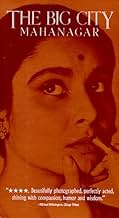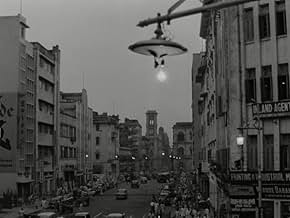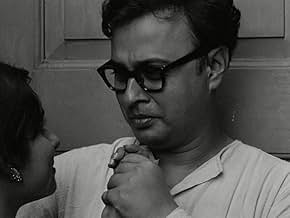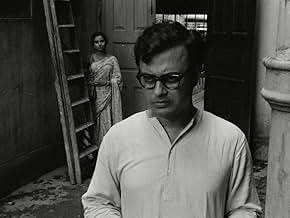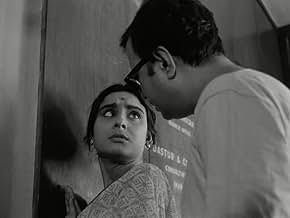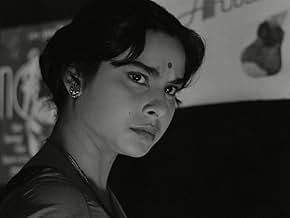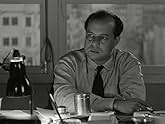IMDb RATING
8.3/10
5.4K
YOUR RATING
Life at home changes when a house-wife from a middle-class, conservative family in Calcutta gets a job as a saleswoman.Life at home changes when a house-wife from a middle-class, conservative family in Calcutta gets a job as a saleswoman.Life at home changes when a house-wife from a middle-class, conservative family in Calcutta gets a job as a saleswoman.
- Director
- Writers
- Stars
- Awards
- 4 wins & 1 nomination total
Madhavi Mukherjee
- Arati Mazumder
- (as Madhabi Mukherjee)
Jaya Bachchan
- Bani
- (as Jaya Bhaduri)
Sefalika Devi
- Sarojini (Subrata's Mother)
- (as Shephalika Devi)
Haradhan Bannerjee
- Himangshu Mukherjee
- (as Haradhan Banerjee)
- Director
- Writers
- All cast & crew
- Production, box office & more at IMDbPro
Featured reviews
The struggle between traditional and modern values in Indian life is the centerpiece of The Big City (Mahanagar), a charming and totally engaging film by the great Indian director Satyajit Ray. Unlike Ray's earlier works which were centered either on the very poor or the very affluent, The Big City deals with the life of an ordinary middle class Bengali family and spotlights the changing role of women in India during the 1960s. Based on a short story by Narendranath Mitra and set in Calcutta, Subrata Mazumdar (Anil Chatterjee) is the sole breadwinner in his family but does not make enough to support his extended family that includes his wife Arati (Madhabi Mukherjee), their young son Pintu (Prasenjit Sarkat), sister (Jaya Bhaduri), father (Haren Chatterjee) and mother (Sefalike Devi).
Subrata's father is a retired school teacher whose pupils have gone on to considerable success as doctors, lawyers, and businessmen while he has slid further into poverty. When the aging patriarch is in need of new eyeglasses, he turns to one of his former pupils to help him out. After Subrata casually mentions that a friend's wife has gone to work, Arati gets the idea of supplementing the family's meager income by getting a job herself but this idea is looked on with disdain by the traditionally-minded family. A "cold war" prevails in the household as Arati takes a job selling sewing machines in affluent neighborhoods, enrolling the woman of the house who is always at home.
After several abortive attempts in which she backs off after hearing the sound of a guard dog, Arati settles into her job and begins to thrive, gaining increased self-confidence and inner strength. Even young Pintu is mollified when his mother brings him home some toys after getting paid. Influenced by co-worker Edith (Vicky Redwood), an Anglo-Indian, Arati begins to wear lipstick and sunglasses and is more assertive with her boss (Haradhan Bannerjee) but her husband is resentful and complains that he doesn't know her anymore. Although Edith persuades her boss to grant the workers a commission on sales, he seems to resent her Westernized manner and feels more comfortable with Arati whom he offers a promotion.
Due to a run on the bank in which he is an employee, Subrata is laid off and this causes additional stresses and strains in the family but their love for each other transcends economics and allows Arati to stand up to her boss on a matter of principle. The Big City is not as sweeping in scope or as in-depth a character study as some of Ray's more well-known films, but it is an honest and compelling portrait of a young woman's discovery of herself with strong performances by Mr. Chatterjee and especially Ms. Mukherjee, who would go on to star in one of Ray's most acclaimed films, Charulata.
Subrata's father is a retired school teacher whose pupils have gone on to considerable success as doctors, lawyers, and businessmen while he has slid further into poverty. When the aging patriarch is in need of new eyeglasses, he turns to one of his former pupils to help him out. After Subrata casually mentions that a friend's wife has gone to work, Arati gets the idea of supplementing the family's meager income by getting a job herself but this idea is looked on with disdain by the traditionally-minded family. A "cold war" prevails in the household as Arati takes a job selling sewing machines in affluent neighborhoods, enrolling the woman of the house who is always at home.
After several abortive attempts in which she backs off after hearing the sound of a guard dog, Arati settles into her job and begins to thrive, gaining increased self-confidence and inner strength. Even young Pintu is mollified when his mother brings him home some toys after getting paid. Influenced by co-worker Edith (Vicky Redwood), an Anglo-Indian, Arati begins to wear lipstick and sunglasses and is more assertive with her boss (Haradhan Bannerjee) but her husband is resentful and complains that he doesn't know her anymore. Although Edith persuades her boss to grant the workers a commission on sales, he seems to resent her Westernized manner and feels more comfortable with Arati whom he offers a promotion.
Due to a run on the bank in which he is an employee, Subrata is laid off and this causes additional stresses and strains in the family but their love for each other transcends economics and allows Arati to stand up to her boss on a matter of principle. The Big City is not as sweeping in scope or as in-depth a character study as some of Ray's more well-known films, but it is an honest and compelling portrait of a young woman's discovery of herself with strong performances by Mr. Chatterjee and especially Ms. Mukherjee, who would go on to star in one of Ray's most acclaimed films, Charulata.
Through 'Mahanagar' the great Satyajit Ray tells a story of an ordinary traditional family living in the modern big city (hence the title). However, the breadwinner of the family does not earn enough money to support the whole family. The wife decides to support him by working herself. Fortunately she finds a job and befriends a modern Anglo-Indian co-worker who does influence her by applying lip-stick and giving her a pair of sunglasses. The father of the family is a retired teacher and he does not accept the fact that his daughter-in-law is working. Gradually, the rest of the family disapprove her working. The retired teacher visits his former student and 'asks' for financial help.
Through this wonderful family drama, Ray tells us a story of the clash between modern and traditional values in a middle-class family struggling to make a living in the big city. Furthermore, Ray examines the 'urban' relationships as is reflected between the employer and employee, the husband and wife, the co-workers, the working mother and her child and so on. It is no surprise that Ray is THE most accomplished director of Indian cinema. This film, like pretty much everything else he did, only reminds us why.
The performances are top-notch. Again, this is no surprise as Ray manages to extract the best from his actors. Madhabi Mukherjee is breathtaking as we see her transform from a naive housewife, to a determined and excited employee to a strong courageous woman who stands up for her friend. Anil Chatterjee is excellent as the struggling husband who tries to make ends meet, silently accepts his wife's working but secretly resenting it. Vicky Redwood adds freshness with a strong presence and a likable performance. Haradhan Bannerjee is very good as the prejudiced but sympathetic boss. Jaya Bhadhuri delivers a very natural performance. The rest of the cast are all just as competent.
The ending isn't the traditional happy ending one witnesses in the numerous Indian films but it's one of optimism and hope that beautifully 'seals' the film. 'Mahanagar' is a fantastic example of the best of Indian cinema. A classic gem it is.
Through this wonderful family drama, Ray tells us a story of the clash between modern and traditional values in a middle-class family struggling to make a living in the big city. Furthermore, Ray examines the 'urban' relationships as is reflected between the employer and employee, the husband and wife, the co-workers, the working mother and her child and so on. It is no surprise that Ray is THE most accomplished director of Indian cinema. This film, like pretty much everything else he did, only reminds us why.
The performances are top-notch. Again, this is no surprise as Ray manages to extract the best from his actors. Madhabi Mukherjee is breathtaking as we see her transform from a naive housewife, to a determined and excited employee to a strong courageous woman who stands up for her friend. Anil Chatterjee is excellent as the struggling husband who tries to make ends meet, silently accepts his wife's working but secretly resenting it. Vicky Redwood adds freshness with a strong presence and a likable performance. Haradhan Bannerjee is very good as the prejudiced but sympathetic boss. Jaya Bhadhuri delivers a very natural performance. The rest of the cast are all just as competent.
The ending isn't the traditional happy ending one witnesses in the numerous Indian films but it's one of optimism and hope that beautifully 'seals' the film. 'Mahanagar' is a fantastic example of the best of Indian cinema. A classic gem it is.
I loved this film. Madhabi Mukherjee is gorgeous and so engaging, with the virtuosic ability to represent the stresses of a changing Kolkata through a simple glance. Mahanagar is a fascinating, dramatic case study of the collision of modernism and traditionalism that produced a sociocultural duality/dichotomy in twentieth-century India's urban landscapes.
We see all sorts of manifestations of duality in Mahanagar. The tension-cum-rivalry of Arati and Subrata is, of course, the most obvious manifestation. However, we also have the duality of the new- generation Arati/Subrata and the old-generation Sarojini/Priyogopal (Subrata's mother and father) and Arati, who wears traditional clothing and speaks Bengali, versus Edith, the English-speaking Anglo-Indian in Western dress. These instances of duality speak directly to the moment in which things began to make a 180-degree shift in India, when women became the breadwinners of the household and traditional gender norms became subsumed by sexual liberation.
With a leading lady as precise as Mukherjee, Ray was able wrap these complex coterminous processes up in a relatively tidy package. Mahanagar is essential viewing.
We see all sorts of manifestations of duality in Mahanagar. The tension-cum-rivalry of Arati and Subrata is, of course, the most obvious manifestation. However, we also have the duality of the new- generation Arati/Subrata and the old-generation Sarojini/Priyogopal (Subrata's mother and father) and Arati, who wears traditional clothing and speaks Bengali, versus Edith, the English-speaking Anglo-Indian in Western dress. These instances of duality speak directly to the moment in which things began to make a 180-degree shift in India, when women became the breadwinners of the household and traditional gender norms became subsumed by sexual liberation.
With a leading lady as precise as Mukherjee, Ray was able wrap these complex coterminous processes up in a relatively tidy package. Mahanagar is essential viewing.
Mahangar captures the middle class culture of post-independence Calcutta effectively. The movie shows the emotional crisis of a family caught between family tradition and increasing expenses. The husband-wife relationship starts unraveling under the stress of brand new corporate identity and financial comfort the wife discovers. Its interesting how the other family members come to terms and make peace with the changed dynamics when they see their own gratification with the higher salary. Ray has done an exceptional job in uplifting the role of the Indian wife and depicting an almost perfect superwoman character rising to the occasion and being the pillar of support at home and at work. Throughout these changes in lifestyle, she continues to rely upon her husband for moral support. The ending is well scripted in their current dire situation, the couple finds mutual confidence and solace to continue the struggle and dream.
Arati is a young middle-class housewife. The household includes Arati, her husband Subrata, who works as a bank clerk, their children and his elderly parents. Subrata is unable to support the entire family with his salary, and after a great deal of indecision, the couple decide that Arati must find a job. And she does so, much to the displeasure of his parents, who react with shame and anger when they find out that their daughter in-law has turned from a housewife into a working woman against tradition.
The story follows Arati's acclimation with her job as a sales woman, her growing independence, and her new relationships with people from different social and financial classes, one example being a young Anglo-Indian colleague named Edith whom she befriends. The real conflict, however, does not happen when Arati's in-laws start a silent "cold war", but when her husband himself loses his own job and Arati becomes the sole breadwinner of the family. Subrata loses self-respect and is filled with negative feelings of inferiority and shame.
This is the story of Satyajit Ray's extraordinary classic 'Mahanagar', a poignant, quiet and moving picture which depicts a whole world of conflicts resulting from modernisation and changing social and generational norms. Ray's portrayal of the urban India, its lifestyle and people, is brilliantly done. Everything about the film is, as expected, very authentic, very real and very easily identifiable with Ray's style of film-making. He makes the proceedings and the characters very interesting and very easy to relate to.
The film deals with the struggle of middle-class families to survive in the big city through their everyday hardships, but in the process, shows the gender role conflicts and criticises the hypocrisy of traditional conservativeness. One such instance is shown when Arati's father-in-law, a retired teacher who had complained that he was in need of a new pair of spectacles, now prefers going and begging from his former student rather than accepting money from his working daughter-in-law who 'breaks tradition'.
The relationships in Mahanagar are perfectly portrayed, whether it's Arati's relationship with her husband, with her kid, with her in-laws, with her employer. But the best thing about it is the portrayal of Arati's acquaintance with her new self. Her job provides her with confidence and self-belief as she grows increasingly independent, both socially and economically. Mainly due to her friendship with the Anglo-Indian Edith, who she would later stand up for, Arati learns to use lipsticks, wear dark fashionable glasses, speak more assertively and stand up against injustice, while still maintaining her individuality as a simple, unselfish woman.
Madhabi Mukherjee is astonishing as Arati. She is a natural beauty, and acts with grace and dignity. She convincingly transforms from a simple housewife into a modern and smart woman of substance, always letting the viewer sense her struggle, confusion and pain. Anil Chatterjee is great as the slightly embittered yet loving husband. Jaya Bhaduri is completely lovable and charming in her debut role. Prasenjit Sarkar is cute as a button as Pintu. Vicky Redwood is quite nice though her line delivery is often weak. Haradhan Bannerjee is very sympathetic as Arati's boss though his character is slightly prejudiced.
Mahanagar is another example of Ray's indelible craftsmanship, of his superb storytelling and his exceptional ability to tell a universal story which is both moving and educative in a simple yet very effective way. The film's pace may be a bit slow, but it is steady enough, and the picture remains thoroughly and consistently engaging and captivating. The ending is bittersweet - sad yet optimistic, satisfying and inspiring. Mahanagar is overall a beautiful social drama; a classic and fascinating piece which is highly recommended.
The story follows Arati's acclimation with her job as a sales woman, her growing independence, and her new relationships with people from different social and financial classes, one example being a young Anglo-Indian colleague named Edith whom she befriends. The real conflict, however, does not happen when Arati's in-laws start a silent "cold war", but when her husband himself loses his own job and Arati becomes the sole breadwinner of the family. Subrata loses self-respect and is filled with negative feelings of inferiority and shame.
This is the story of Satyajit Ray's extraordinary classic 'Mahanagar', a poignant, quiet and moving picture which depicts a whole world of conflicts resulting from modernisation and changing social and generational norms. Ray's portrayal of the urban India, its lifestyle and people, is brilliantly done. Everything about the film is, as expected, very authentic, very real and very easily identifiable with Ray's style of film-making. He makes the proceedings and the characters very interesting and very easy to relate to.
The film deals with the struggle of middle-class families to survive in the big city through their everyday hardships, but in the process, shows the gender role conflicts and criticises the hypocrisy of traditional conservativeness. One such instance is shown when Arati's father-in-law, a retired teacher who had complained that he was in need of a new pair of spectacles, now prefers going and begging from his former student rather than accepting money from his working daughter-in-law who 'breaks tradition'.
The relationships in Mahanagar are perfectly portrayed, whether it's Arati's relationship with her husband, with her kid, with her in-laws, with her employer. But the best thing about it is the portrayal of Arati's acquaintance with her new self. Her job provides her with confidence and self-belief as she grows increasingly independent, both socially and economically. Mainly due to her friendship with the Anglo-Indian Edith, who she would later stand up for, Arati learns to use lipsticks, wear dark fashionable glasses, speak more assertively and stand up against injustice, while still maintaining her individuality as a simple, unselfish woman.
Madhabi Mukherjee is astonishing as Arati. She is a natural beauty, and acts with grace and dignity. She convincingly transforms from a simple housewife into a modern and smart woman of substance, always letting the viewer sense her struggle, confusion and pain. Anil Chatterjee is great as the slightly embittered yet loving husband. Jaya Bhaduri is completely lovable and charming in her debut role. Prasenjit Sarkar is cute as a button as Pintu. Vicky Redwood is quite nice though her line delivery is often weak. Haradhan Bannerjee is very sympathetic as Arati's boss though his character is slightly prejudiced.
Mahanagar is another example of Ray's indelible craftsmanship, of his superb storytelling and his exceptional ability to tell a universal story which is both moving and educative in a simple yet very effective way. The film's pace may be a bit slow, but it is steady enough, and the picture remains thoroughly and consistently engaging and captivating. The ending is bittersweet - sad yet optimistic, satisfying and inspiring. Mahanagar is overall a beautiful social drama; a classic and fascinating piece which is highly recommended.
Did you know
- TriviaFifteen-year old Jaya Bhaduri's (later known as Jaya Bachchan) film debut and her only film with Satyajit Ray.
- GoofsWhen Priyogopal (Subrata's father) goes to visit his student Anupam Roychowdhury to ask for money he is shown having a conversation with Anupam in his office. When he is explaining his circumstance the camera shows him only sitting on a chair with his walking stick. In the very next scene when all the three characters are shown (third one being Anupam's wife ) the top of his walking stick has changed direction. The round bit on top was towards the right before and is turned to the left in the very next scene.
- Quotes
Arati: You wouldn't recognize me on the job.
Subrata Mazumdar: What about at home? Would I recognize you at home?
Arati: You don't recognize me? Tell me honestly.
[Subrata shakes his head no]
Arati: Why not?
Subrata Mazumdar: It all feels a bit unfamiliar. It feels a bit...
Arati: What about this?
[points at her cheek]
Arati: You don't recognize my mole? I'm still the same housewife.
- ConnectionsReferenced in Creative Artists of India: Satyajit Ray (1964)
- How long is The Big City?Powered by Alexa
Details
- Release date
- Country of origin
- Official site
- Languages
- Also known as
- The Big City
- Filming locations
- RN Mukherjee Rd, Calcutta, West Bengal, India(closing shot: view of the city)
- Production company
- See more company credits at IMDbPro
- Runtime
- 2h 16m(136 min)
- Color
- Sound mix
- Aspect ratio
- 1.37 : 1
Contribute to this page
Suggest an edit or add missing content


